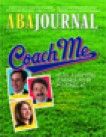Keen on Coaching

Thank you so much for your innovative feature article, “Coach Me,” June.
It shed light on the coaching process in a clear and direct manner. The case studies help people to understand a process that is sometimes confusing. I appreciated that each coach had his or her own unique flavor and methods, and each matched well with the attorney-client. I am delighted, but not surprised, that all three attorneys saw progress in such a short time.
Marilyn August
Aliso Viejo, Calif.
UPSETTING ARTICLE
Terry Carter’s article in the June issue, “Collaring the Clergy,” is as shameful a piece of propaganda as I have ever read. To paint Jeffrey Anderson as some sort of altruistic crusader who wants to rid the world of pedophiles, with little interest in the piles of money he makes, is laughable. The “losingest lawyer in the world”? Yeah, right.
And let’s set the record straight. The John Jay report [a research study released in 2004 that was authorized by the United States Conference of Catholic Bishops and conducted by the John Jay College of Criminal Justice] declared that nearly 80 percent of the victims of the clerical sexual abuse scandal were post-pubescent boys. By definition, this makes the priest sex scandal an issue of homosexuality, not pedophilia.
Stephen M. Stafford
Walker, La.
I am a Catholic and a member of the American Bar Association since 1967. There are few more upset over the actions of the Catholic clergy, particularly the Catholic bishops, than I am. Nevertheless, when I received the ABA Journal and noticed on top of the cover the line “Catholic Church’s Least-Favorite Lawyer,” I became upset. When you look inside and see how ballyhooed this lawyer is, I assume that the unsaid comment is that he is the ABA’s most favorite lawyer.
These lawsuits go on as they should, but I do not need the ABA championing the cause. What deep-seated need is there in this association, requiring gratification, that you gratuitously go after the Catholic Church? The ABA has a well-deserved reputation for acting with an utter lack of sensitivity to its membership, and it appears you are keeping up the good work.
Peter V. Coffey
Schenectady, N.Y.
A TOSS-UP
In the June issue, you ran a summary of research conducted by Philip G. Peters of the University of Missouri-Columbia School of Law about the correctness of jury decisions in medical-malpractice cases (Med-Mal Rx). I was interested by both the ABA Journal’s summary of the information and by Peters’ conclusion that juries are “doing a good job of rejecting meritless medical-malpractice cases.”
When you ignore the lowest possible percentages (which were highlighted in the summary) and instead look at the greatest possible percentages provided, it doesn’t appear to me that in either finding for or against defendant physicians, juries are doing significantly better than a coin toss would. It appears that plaintiffs prevail 50 percent of the time the evidence is deemed “strong” and close to 50 percent of the time the evidence is deemed “unclear” or “weak.” (It is difficult from the summary to determine the exact percentage since the number of cases analyzed for each group was not provided.)
Kelly Pikus
Arden, N.C.
AN INVALUABLE RESOURCE
Martha Neil’s incisive article on the perils awaiting U.S. lawyers dealing with foreign law issues (“You’re Fired,” May) offers sound advice to find foreign counsel who know, understand and can explain the law. Any assumption that other legal systems work in a familiar manner, or that words carry the same legal meaning as in the United States, would be misleading.
Neil’s note under “Knowing who to call,” however, may stand mention of a valuable resource available in the U.S. The staff of overseas-trained foreign law specialists in the Law Library of Congress works on a priority basis for the U.S. Congress and federal agencies, dealing with an array of foreign law issues.
We would be willing to provide [to members of the legal community] brief statements on foreign legal issues and applicable standards, including reference sources available in English. Such preliminary assistance would enable U.S. attorneys to gain a grasp of the legal issues involved and become better informed prior to any dealings with local counsel.
Requests to the Law Library of Congress for legal reference inquiries should be sent to [email protected] or faxed to 202-609-9264.
Rubens Medina
Law Librarian of Congress and Director of Legal Research
Washington, D.C.
THE COPYRIGHT SIDE
I read with interest the May article in the ABA Journal titled “Crisis Pending,” which discussed whether a patent on a legal strategy can prevent a client from taking his or her attorney’s advice. That is the patent side of the issue, but what about the copyright side? Many businesses or institutions routinely copyright their written work. Even form books intended for use by their readers bear a warning not to copy the very forms they are selling for that purpose. The patent and copyright system needs an overhaul. Lawyers generally were very sharing people. When you needed a form or advice, it was given freely by a fellow attorney. Why should a few greedy lawyers be permitted to spoil the custom?
Jim St. Clair
Huntington, W.Va.
Sidebar
CORRECTION
It was incorrectly reported in “The Body in Question,” July, that the Kent County, Mich., coroner had retained the brain of a deceased 91-year-old man after an autopsy in 2005. The autopsy was performed by a private pathologist not associated with the county who is under contract to the hospital in which the man died.
The Journal regrets the error.



